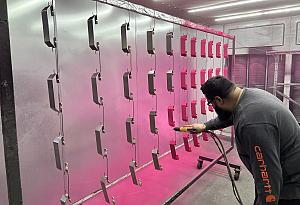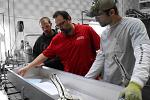- FMA
- The Fabricator
- FABTECH
- Canadian Metalworking
Categories
- Additive Manufacturing
- Aluminum Welding
- Arc Welding
- Assembly and Joining
- Automation and Robotics
- Bending and Forming
- Consumables
- Cutting and Weld Prep
- Electric Vehicles
- En Español
- Finishing
- Hydroforming
- Laser Cutting
- Laser Welding
- Machining
- Manufacturing Software
- Materials Handling
- Metals/Materials
- Oxyfuel Cutting
- Plasma Cutting
- Power Tools
- Punching and Other Holemaking
- Roll Forming
- Safety
- Sawing
- Shearing
- Shop Management
- Testing and Measuring
- Tube and Pipe Fabrication
- Tube and Pipe Production
- Waterjet Cutting
Industry Directory
Webcasts
Podcasts
FAB 40
Advertise
Subscribe
Account Login
Search
HAL 9000 2.0
- By Vicki Bell
- May 13, 2009
Scanning news releases yesterday, I quickly passed over those with headlines that reminded me that this is not the best of times economically—there was no shortage. Ditto for the political surveys predicting the unqualified success or the unmitigated failure of potential congressional actions. I simply was not up for gloom and doom or political hype from biased entities.
What finally caught my undivided attention was an item about Lockheed Martin's Advanced Technology Laboratories (ATL) and the latest in computer research and technology. If you were around when computers first were introduced, you might recall the fear that computers would replace humans in the workplace and possibly overtake mankind. Well, that's a bit of an exaggeration, although HAL 9000 gave us food for thought.
It's true that computer technology has replaced some workers, but computers have a long way to go before they can truly mimic human reasoning—a necessary part of many successful endeavors—or do they?
According to the release, "engineers at Lockheed Martin's Advanced Technology Laboratories (ATL) are using brain-inspired computing techniques to enable machines to think like humans.
"And thinking like humans is vital if we expect computers to evolve from mere number crunching tools to partners capable of ferreting out and then reasoning about critical bits of information from staggering volumes of data from thousands of sources.
"Computers have a big advantage over humans when it comes to processing large amounts of data accurately and quickly. Unlike humans, however, computers lack the intellectual wherewithal to deduce and predict from that data an object's behavior and patterns.
"That's why brain-inspired computing is so important. It blends the processing capability and speed of computing with the cognitive sophistication of a human. Computers also have limited resources and can usually only solve comparatively narrow, well-defined problems. They cannot learn as humans do, cannot draw from past experiences, and have difficulty accurately and consistently processing incomplete—or fuzzy—information.
"The ramifications for national and local security will be significant if technologists are able to someday apply the unique capabilities of the human brain to help computers analyze the uncertainties and complexities of global conflict, homeland security, terrorism, or local public safety.
"In England, for example, there are about 4.2 million closed-circuit television cameras that monitor a number of public venues, such as streets. The sheer volume of video data gathered is staggering. But a relatively small number of individuals view those video feeds—and then must then make spot decisions about suspicious behavior, patterns of activity, or events that could trigger illegal activity or hostile action.
"By mimicking the intricate network of the brain's neural pathways and processes, ATL engineers are teaching computers to learn, manage information overload, discover patterns, and discern human intent.
"In short, these are computers that are beginning to think like humans."
And that's a good thing? If computers think like humans, will they become more human, as in we"re only human—an excuse for unacceptable performance? And if humans are that good at discerning human intent, many atrocities throughout history may have been prevented.
subscribe now

The Fabricator is North America's leading magazine for the metal forming and fabricating industry. The magazine delivers the news, technical articles, and case histories that enable fabricators to do their jobs more efficiently. The Fabricator has served the industry since 1970.
start your free subscriptionAbout the Author

Vicki Bell
2135 Point Blvd
Elgin, IL 60123
815-227-8209
- Stay connected from anywhere

Easily access valuable industry resources now with full access to the digital edition of The Fabricator.

Easily access valuable industry resources now with full access to the digital edition of The Welder.

Easily access valuable industry resources now with full access to the digital edition of The Tube and Pipe Journal.
- Podcasting
- Podcast:
- The Fabricator Podcast
- Published:
- 04/16/2024
- Running Time:
- 63:29
In this episode of The Fabricator Podcast, Caleb Chamberlain, co-founder and CEO of OSH Cut, discusses his company’s...
- Industry Events
16th Annual Safety Conference
- April 30 - May 1, 2024
- Elgin,
Pipe and Tube Conference
- May 21 - 22, 2024
- Omaha, NE
World-Class Roll Forming Workshop
- June 5 - 6, 2024
- Louisville, KY
Advanced Laser Application Workshop
- June 25 - 27, 2024
- Novi, MI































